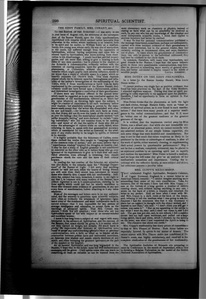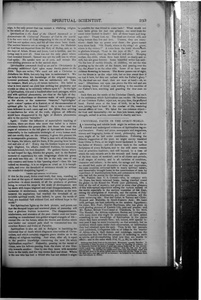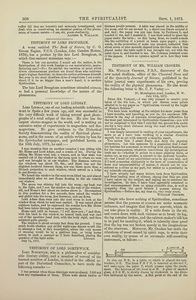The Eddy Family, Mrs. Conant, etc.
To the Editor of the Scientist: — I was sorry to see in your issue of August 12th, the strictures of the correspondent of the Boston Herald, upon the Eddy manifestations, republished with remarks which seemed rather favorable than otherwise the writer, whose testimony is so inimical, both in its spirit and its matter, to William Eddy as a medium. Surely this young man whose early life was one of martyrdom to the cause, has suffered enough from the opponents of Spiritualism, without having suspicions cast upon him at second hand by Spiritualists, who know nothing from observation to his disadvantage. I would have fair and full investigation, and am more than willing to give a hearing to both sides of any open question; but to present to the readers of the Scientist a communication, evidently written with the intention of casting suspicion upon the genuineness of the phenomena, at Chittenden, without any accompanying remarks which might qualify such adverse influence, seems to me worse than a waste of valuable space in a paper which so heartily endorses Col. Olcott's book. This book depends almost wholly for its interest upon the thoroughness and reliability of the author's investigation of the mediumship of the Eddys, while if those manifestations at Spirit Vale be fairly represented by the correspondent of the Boston Herald, they certainly could not have forced upon a disinterested, patient, and determined investigator a conviction of their genuineness.
If there were any evidence offered in the quoted letter which could be regarded as in any way conclusive against the genuineness of the manifestations referred to, or which had any value whatever as throwing light upon the subject, it might be a matter of conscience to set such testimony before your readers; but absolutely nothing is proven by the statements made except that the writer was dissatisfied with what he saw and heard; —for instance, with such facts as these, vis, that Honto did not fly over the heads of the circle as well as over the railing—that the materialized shawls seemed “not unlike mosquito netting” and were declared by certain “carping individuals,” who did not examine them, to be nothing else—and worst of all, that the spirits of those who did not enjoy the advantages of culture while on earth, failed, when returning in form, to speak with that grammatical accuracy which is considered by the writer so essential to the utterance of any truths worthy to be taught by spirits, or listened to by mortals.
It is highly probable that the fishermen of Galilee, sometimes clothed the truths they taught in “language deficient of the common rules of syntax,” and yet many believe that a “superhuman wisdom” inspired the thoughts so humbly clad. It may be that a study of English grammar is not considered so essential on the other side, as to induce those who go over ignorant of its requirements to give to it their first and undivided attention, even although in returning, they should perchance shock the ears and the taste of their critical hearers.
In reading the last number of the Scientist, my attention was also drawn to the remarks upon the “Message Department” of the Banner of Light. I felt sorry that anything should be said just now, when the hearts of loving friends are still sore from their recent loss, calculated to wound those who identify Mrs. Conant with her mediumship. Still, since the subject has been broached, it seems to me right to say that I, in common with many readers of the Banner, have always regretted to see in it communications, claiming to be from spirits, which could not but be utterly worthless to those who demand some evidence of genuineness, in any and every form of manifestation, before attaching to it any value whatever.
Most of the messages and letters were in no way authenticated, and the answers to questions upon scientific subjects, were often so evidently the utterances of ignorance—ignorance even of the commonest and most indisputable facts in natural science—that it was impossible for any person of average intelligence and education to accept them as the teachings of advanced spirits. That Mrs. Conant was sincere, I think few will question; even those who are not Spiritualists speak of her with respect as an earnest-minded and excellent woman.
I know it has long been a subject of real regret with many interested in the advance of Spiritualism and the success of the Banner, that space should be given in it to matter which not only carried no weight, but actually did much harm in giving the impression that believers in Spiritualism were ready to accept any and everything offered to them as spiritual communications, with a faith as blind as to hinder all discrimination between proven facts and unfounded assertions, or between true wisdom and words utterly destitute of any worth, and often betraying the grossest ignorance on the part of the speaker or the inspirer.
As an earnest Spiritualist, and one long interested in the Banner, I hope that in the future none but well authenticated messages will be given. Until spirits come who can teach us something, at least as valuable as can be learned front the most elementary work on chemistry or physics, instead of stating as facts what can by no possibility be received as such, by any one who has any knowledge of the simplest and most indisputable scientific truths, I think their replies to anxious inquirers had better be omitted.
It may be that the personal communications published in the message department, sometimes, perhaps not unfrequently, carried with them intrinsic evidence of their genuineness to those most interested, but to the general reader, they had certainly nothing to recommend them, and were, therefore, out of place. In cases where the genuineness of communications can only be proven to the individual addressed, they had best be confined to the circle room.
In common, therefore, with many true Spiritualists, and good friends to the Banner, I hope that the space hitherto given to these very questionable communications, may hereafter be devoted to something more worthy of general attention, and better calculated to inspire respect in the minds of sensible people.
Universal Faith in the Spirit-World
An interesting and valuble book might be written on the incidental and undesigned evidences of Spiritualism in general literature. Poetry and prose, newspapers and magazines, history and biography, books of travel, philosophy, and science, might all be laid under contribution. Following the didactic suggestion of the poet, we might survey mankind from China to Peru, or we might travel backward in time to the father of History; and still farther back to the earliest Scriptures of every Religion, and to the still more remote time of primitive tradition; and still beyond, to a time of which the only records are in the mounds and burial places of the first races of mankind; and in all climes and periods, in all stages of society, and in all varieties of condition, character and culture; in the saint, the savage and the sage, we should find, under all diversities of form and expression, the same essential, universal faith in man’s spiritual mature, and immortality brought home to the consciousness of men by experience of manifestations from, and communion with those who hid left the mortal for the immortal state.
Mr. Peebles (late U. S. Consul)—who, in company with Dr. Dunn, has lately returned home, having traveled round the globe—in his Round the World (just published), lifts a little of the veil of mystery, and gives us some clear glimpses of this wide-spread experience among the various nations of the world, especially in the ancient countries of the East, among the aboriginees of Australia, and the natives of Polynesia. Travelers, missionaries, and other residents, tell the same unvarying tale. Hue and Gabet, in Tartary and China; Howard and Malcolm, in South-Eastern Asia; Mr. Lane (still, perhaps, our best authority on the modern Egyptians); his sister, Mrs. Pool; Harriet Martineau, who has given us such glowing pictures of Eastern Life, past and present; and Mr. Barker, British Vice-Consul at Theodosia, in his work The Mendal; the African explorers, Burton and Livingstone, with many more who might be enumerated, all have added something to our knowledge of Spiritualism in the places where they have severally been; not, indeed, with special intent (and it may be more trustworthy on that account), but as incidents which came under their observation, or information they had obtained upon the spot. Thus, in his last journals (just published), Livingstone tells us of tribes in the interior of Africa who, in their dances and rejoicings, express the satisfaction they feel that the prospect of returning to earth as spirits, and accomplishing what now they are unable to effect; and in the same work (Vol, II., p. 86), he tells us; —
Suleiman-ben-Juma lived on the main-land, Mosessame opposite Zanzibar. It is improssible to deny his power of foresight, except by rejecting all evidence, for he frequently foretold the deaths of great men among Arabs and he was pre-emi-nently a good man, upright and sincere — “Thisti,” none like him now for goodness and skill. He said that two middle-sized white men, with straight noses and flowing hair down to the girdle behind, came at times and told him things to come. He died twelve years age, and left no successor; he foretold his own decease three days beforehand, by cholera.
Testimony of Lord Brougham
A work: entitled The Boole of Nature, by C. O. Groom Napier, F.C.S. (London, John Camden Rotten, 1870), has a preface by the late Lord Brougham, in which that eminent statesman says:—
There is but one question I would ask the author, is the Spiritualism of this work foreign to our materialistic, manufacturing age?—No; for amidst the varieties of mind which divers circumstances produce are found those who cultivate man’s highest faculties; to these the author addresses himself. But even in the most cloudless skies of scepticism I see a raincloud, if it be no bigger than a man’s hand; it is modern Spiritualism.
The late Lord Brougham sometimes attended seances, so had a personal knowledge of the nature of the phenomena.
Editor's notes
- ↑ The Eddy Family, Mrs. Conant, etc. by Andrew, Louisa, Spiritual Scientist, v. 2, No. 25, August 26, 1875, p. 298
- ↑ Universal Faith in the Spirit-World by unknown author, Spiritual Scientist, v. 2, No. 20, July 22, 1875, p. 233
- ↑ Testimony of Lord Brougham by unknown author, London Spiritualist, No. 59, September 1, 1873, pp. 308
Sources
-
Spiritual Scientist, v. 2, No. 25, August 26, 1875, p. 298
-
Spiritual Scientist, v. 2, No. 20, July 22, 1875, p. 233
-
London Spiritualist, No. 59, September 1, 1873, pp. 308



